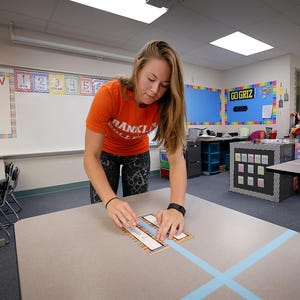Bangert: Education reform’s next trick? Teacher shortage
What sort of gymnastics will state lawmakers try to pull off at this point to remedy a looming teacher shortage after years of running off potential, young candidates by convincing Hoosiers that public schools were essentially broken?
And will they actually be willing to shoulder some of the blame?
We’re about to find out.
Last week, the chairmen of the Indiana House and Indiana Senate education committees asked House Speaker Brian Bosma for a summer study into the creeping ambivalence to the teaching profession. It’s a situation that has depleted the ranks of undergrads studying education in state universities and put some districts on their heels when it comes to recruiting for open positions.
In their letter to Bosma, Rep. Robert Behning and Sen. Dennis Kruse laid out numbers that have pricked up ears in recent months. New data from the state show that “licenses issued to first-time teachers (have) declined from 16,578 in 2010 to 6,174 in 2014.”
“We think,” Behning and Kruse wrote, “it would be wise for the Indiana General Assembly to proactively address this issue.”
No kidding.
Where to start?
The biting commentary came right away from teachers, who have been bristling under state-pushed reforms — the killing of collective bargaining, the rise of private school vouchers, pay raises tied in part to student performance on standardized tests and more — put into high gear in 2010.
“It’s not that hard to figure out,” said Randy Studt, a German teacher at West Lafayette High School. “We could get this problem sorted out in, I don’t know, an afternoon. … The fact that they’re just now realizing this is a problem? Come on. Look in a mirror, you guys. Listen to what you’ve been telling Indiana — and what you’ve been telling teachers, in particular.”
Maybe a decent place to start would be with a recording from the May 14 Purdue University trustees meeting. That day, College of Education Dean Maryann Santos de Barona laid out the situation on the West Lafayette campus, where undergraduate enrollment in her school is down 33 percent since 2010.
Santos de Barona talked about starting pay that forced some teachers, early in their careers, to pick up second jobs to make ends meet. She talked about the message sent when schools were growingly reluctant to give a classroom over to a student teacher because the stakes were so high. And she talked about how each twitch by the Statehouse raised new doubts of trust and worth in classrooms.
She was clear: This was a national issue, playing out not just at Purdue or other campuses in Indiana.
Still …
“Our profession is at a critical juncture,” Santos de Barona told Purdue trustees. “The pervasive negativity about the teaching profession, and the misconception that Bangert: Education reform’s next trick? Teacher shortage:


